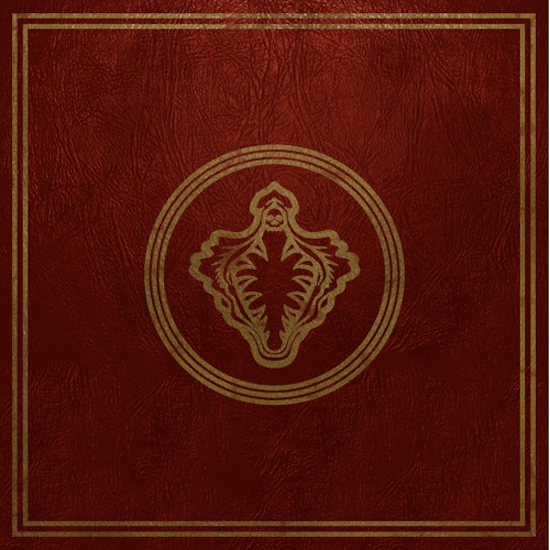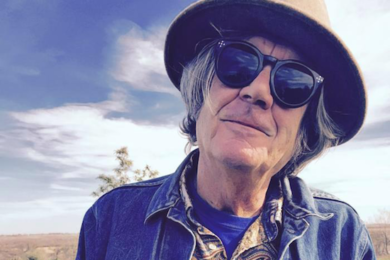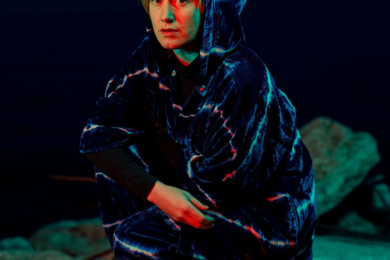A shock-and-awe surprise that was destined to happen all along? It sounds like an intentionally puzzling conundrum, but there’s no need to riddle anyone anything: it’s the seventh full-length album by Norway’s Årabrot. The Gospel‘s many virtues may seem, to some, as awkward matches for each other. It’s generally noisy and gnarly, variously downtuned or detuned and proud of its metallic heft; if you’ve encountered Årabrot in the past, this will be expected. It also has a dark, velveteen grace which feels derived from both pop and cabaret songwriting, and while previous records by the band have hinted at this tendency, here they’ve embraced it to a far greater degree than before.
So, kind of a curveball, but one whose clues were there in hindsight. Does that really warrant the mild histrionics of this review’s opening sentence? Well, there’s a bit more to it. The Gospel is Årabrot’s first album since Kjetil Nernes, the group’s frontman and sole remaining founder member, was diagnosed with throat cancer in early 2014. Which, for all the obvious gravity implied by that statement, still means that Nernes toured the UK immediately post-diagnosis, underwent treatment (described in graphic detail here), recuperated in full, and then wrote, recorded and promoted a nine-song, 42-minute album, all in less than two years. Oh, and a six-song EP, You Bunch Of Idiots, which came out last summer. Plus a lengthy tour of the UK providing musical backing for John Doran of tQ’s spoken word sets, which I imagine falls under the category of ‘full disclosure’ or somesuch. Anyway, my point is that The Gospel‘s existence is remarkable on one hand; on the other, it paints its vocalist as a damn force of nature, for whom this was his destiny.
Yeah, you got me: purple, hyperbolic prose better suited to a WWE commentary team. Listening to this album sorta does that to you. It feels palpably defiant, confident and grand guignol-like in its nature, from the first few seconds onwards. Bookending its heavy post-punk rumble, the title track and album opener starts with a barked military command of some kind and finishes with a crackly sample of an army band. Bearing in mind Nernes’ assertion in the 2014 interview for tQ linked above, "everything that happened this summer feels like war," it seems fair to assume that he’s not only employing symbolism here, but borrowing Thor’s hammer to whack it into place. (There is, rest assured, more imagery on this record worthy of discussion).
Aside from their frontman, Årabrot have generally had a changeable lineup; this album features a core quartet of Nernes, guitarist Milton von Krogh, drummer Magnus Nymo and synth player Karin Park. The Gospel is their first release to lean heavily on guest musicians – indeed, on ‘The Gospel’ Nernes ditches the rest of his band and performs with them exclusively. Of Sunn O)))’s Stephen O’Malley, Nurse With Wound/Current 93 associate Andrew Liles and Ted Parsons, of several bands including Swans and Killing Joke, only the latter is making a noise that might be expected of him: thundering KJ-style drums over a menacing, martial march into annexable gothic territory.
Hereafter, these three guests dip in and out of the lineup, which varies from song to song. Accordingly, this is probably the most eclectic-sounding Årabrot release to date, as well as the most grandiose. ‘I Run’ says its piece in under three minutes; noisy and droney, it ultimately takes ‘rock song’ form but maintains avant-garde signifiers, and adds grist to the feeling that Nernes would, in time, like to fashion himself into a Nick Cave or Scott Walker-esque auteur. That said, it’s Karin Park who’s arguably the most important driver of the sound here – her piano parts add crucial counterbalance, and gleam dead centre in the mix. (When I saw Årabrot on their spring ’14 tour, it was instantly clear how much her presence changed the band’s dynamic.)
Keys are, again, a vital component to ‘Tall Man’, which echoes the Faith No More of Angel Dust – black-humoured, self-sabotaging crypto-pop-metal – thus making Park the Roddy Bottum of Årabrot. She chimes in with a demented rock & roll clatter on ‘I Am The Sun’, which features no less than nine performers, and is sonically busy as that suggests – something in no way offset by Nernes’ efforts to include the word "tintinnabulation" in his lyrics. When the band whip themselves to a brutish climax, before instantly giving way to the unaccompanied vocals of Norwegian synthpop blog favourite Kine Sandbæk Jensen ("Drain that cradle, dear sun / You are the god I worship the most"), it’s a hugely effective moment of contrast.
Årabrot have always flaunted their metallic tendencies, but could never be properly described as a metal band. Their last, self-titled full-length from 2013 probably sailed the closest to it, a healthy dose of Melvins being apparent in the guitars. (Checking back, I also appear to have written a review of it in which I describe Nernes’ vocals as "throaty". Ahem.) On several occasions, however, The Gospelramps that side of them up. The main riff that takes hold five minutes into ‘Faustus’, and is maintained for five more – most Årabrot albums have ‘an epic’, this is that – chugs and crunches as cleanly, purposefully, as Helmet or 1991 Metallica. This is new territory for the band, and makes it more admirable that ‘Faustus’ also finds room for Andrew Liles – I assume he’s responsible for the creepy quasi-choral intro.
Matters get even more mook-metal-friendly on ‘Ah Feel’, whose chorus is sung in Norwegian by Erlend Hjelvik of Kverlertak. It has the gas station-shirted noiserock meanness of early-90s Amphetamine Reptile Records bands and the flapping-Dickies breakdowns of late-90s Deftones, which should be an awful combination but somehow works a charm. The closest the album comes to ‘proper’, punked-up noiserock is ‘Darkest Day’, replete with some terrific Duane Denison-style chainsaw guitar – yet there’s one more feint on the LP for us, closing number ‘Rebekka (Tragedie)’. Based for the most part around Nernes’ one-thumb bassline, it took a few listens before I twigged that its melody and structure resemble a 60s girl group song, even if aesthetically it ends up somewhere much louder and burlier.
It concludes with a death, as it doubtless would had Shadow Morton written the lyrics. This is not a brand new fixation for Kjetil Nernes, it should be noted: Årabrot, for example, is fairly soaking in it. If anything, he now seems less inclined to toss around references like confetti – if The Gospel is a fuck-you to the vanquished cancer, it’s also awed at the spite with which it can ravage a body. What with Årabrot’s lyrical tack largely consisting of metaphor, allegory and literary references, sometimes crammed into metres that really shouldn’t fit, there’s a degree of projection involved in mulling the lyric sheet. "A tall, white stranger / In his hand a long spear / At iron’s point a fire / He thrust it in my heart," runs the second verse of ‘The Gospel’. ‘Ah Feel’ adds a moment of almost-literalism: "And I smell it up the nose / Where the sickness is / And I’m bound for the grave." Nernes paints himself as a weakened supplicant on ‘And The Whore Is This City’, adding almost self-mocking yelps after certain lines: "Oh dear mistress Hecate, did I hurt you? / What have I done to you?"
Perhaps Årabrot will be helped by releasing this superb album into a world of rebooted-for-2016 music consumers, their analytical minds sharpened by the posthumous discourse around David Bowie’s final release. Obviously, this sidesteps the fact that if The Gospel receives even one percent of the attention given to Blackstar, it will amount to a significant profile boost for the Norwegian group, but it honestly does deserve to be heard on a far wider scale than anything they’ve previously released. Before, their appeal was limited by their approach, however excellent it might have been. Now, the sludgy guitars and snarled lyrics are a minor component, not the driving force. There’s tinkled ivories, rock-club air guitar moments, a genuine pop sensibility, camp theatre and high drama. Plus a backstory with an ending that’s happy not just for Årabrot, but for all of us.







